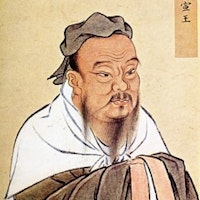To Study and Practice
Topic: Temperance & Humility
“Isn’t it a pleasure to study and practice what you have learned? Isn’t it also great when friends visit from distant places? If one remains not annoyed when he is not understood by people around him, isn’t he a sage?”
Confucius
ConfucianismThe Analects
“Confucius.” Confucius - Wikiquote, en.wikiquote.org/wiki/Confucius#Chapter_I. [The Analects Chapter I].

Confucius
Resources
Copyright © 2017 – 2024 LuminaryQuotes.com About Us


The Analects Chapter I
The opening of the Analects and thus the first phrase of Chapter I after which the Chinese title of this book is named 學而.
Confucius
“Isn’t it a joy to study and regularly practice? What’s more, isn’t it a joy to meet comrades from afar? ” These are the opening words of the Analects of Confucius, a small collection of sayings by the ancient pioneer of liberal arts education. The “study” Confucius refers to does not only focus on book learning, but rather on social relationships, and not least, the great virtue of “humanity”. Learning about “humanity”, and trying to realize it in our lives, especially in the company of fellow travelers on the great path or Tao, fills us with a sense of joy.
–Dr. Mark Setton [Confucius, The Pursuit of Happiness website].
Additional Quotes and Commentary
“When the Superior Man (Junzi) eats he does not try to stuff himself; at rest he does not seek perfect comfort; he is diligent in his work and careful in speech. He avails himself to people of the Tao and thereby corrects himself. This is the kind of person of whom you can say, “he loves learning.””
–Confucius [The Analects Chapter I].
Retrospection of his own life. From this phrase, alternative names for each decades of human life are derived in Chinese:
“At fifteen my heart was set on learning; at thirty I stood firm; at forty I had no more doubts; at fifty I knew the will of heaven; at sixty my ear was obedient; at seventy I could follow my heart’s desire without overstepping the boundaries of what was right.”
–Confucius [The Analects Chapter II].
“If a man has no humaneness what can his propriety be like? If a man has no humaneness what can his happiness be like?”
–Confucius [The Analects Chapter III].
Dr. Mark Setton, An Imaginary Conversation with Confucius
MS: Thank you so much for agreeing to give this interview. I know you must be very busy. New sayings of yours seem to be popping up quite regularly.
Confucius: (Laughs). I have nothing to do with most of that. People are making up stuff! And Chinese restaurants are only the tip of the iceberg.
MS: About 2,500 years have passed since you, Buddha, and Aristotle taught about the keys to finding happiness. Yet many people still appear to be miserable. Anti-depressants are now the best-selling drugs in America. Is it because human beings can’t change?
Confucius: No, I don’t think so. I claim that anybody can become a “Chunzi,” a noble person. The word used to mean “son of a noble.” But it doesn’t matter who your parents are. It’s about who you are. A Chunzi is a person of moral nobility. That sort of virtue is the source of greatest happiness. But its not easy to cultivate, especially nowadays.
MS: Why do you say “nowadays?”
Confucius: I thought the Zhou dynasty was in a bad way till I began surfing the internet. Industrialization has uprooted and scattered your families. Too many grandparents are no longer around to care for their grandchildren. Too many parents, struggling to make ends meet, have lost sight of the great goals in life: self cultivation and social harmony. Meanwhile their children grow up playing “grand theft auto” and emulating the lives of celebrities.
MS: Industrialization and the internet have produced a lot of serious side effects. But surely we can’t return to farming and hunting!
Confucius: I still think we can do some more farming! We can till the soil in which happiness can flourish. What I mean is, we have to cultivate our relationships, beginning with our family members. Love for parents and respect for our peers are the root of humanity.
MS: Now that’s what I want to ask you about. You talk about humanity a lot. I think you mention it nearly one hundred times in the Analects (Ed: The Analects are the earliest recorded sayings of Confucius). What is it? And how is it related to happiness?
Confucius: Well, the Chinese graph for “ren,” which you can translate as “humanity” or “benevolence,” is simply a symbol of a person next to the symbol for the number two. Humanity is realized if we think about the “we” as much as the “me.” People are fond of quoting the expression “no man is an island” from a poem by John Donne. He was trying to say the same thing. The funny thing is, perhaps Donne didn’t think about what an island really is. Islands are a lot like people. On the surface, we appear to be separate and independent. Yet under the surface we are linked together. What I’m saying is, your happiness is inseparably linked to the happiness you create for others.
MS: In the Analects you say a lot of different things about humanity.
Confucius: That’s because different patients need different medicines. Each person experiences a different obstacle to becoming humane. For some it is selfishness. For others it’s plain old greed. Simply speaking, humanity is a sort of practical sympathy. Its about putting yourself in someone’s shoes and acting upon it. And the emphasis is on acting. Sympathy is the easy part.
MS: Yes, talk is cheap.
Confucius: The Chunzi, I mean the noble person, acts before he speaks. After that, if he is pressed, he may talk about what he has learnt.
MS: I noticed that the only verse that appears twice in the Analects refers to hypocrisy.
Confucius: Oh yes. I warn about people who are quick to please and “skillful with words.”
MS: I was shocked to read that you hate the “proper villager,” claiming that he is a “thief of virtue.” You don’t use language like that very often…
Confucius: Yes I feel quite strongly about that. About people who appear to do the right thing, but for the wrong reasons. Intentions are quite powerful.
MS: But aren’t you famous as an expert on ritual and social skills? If you behave well for the wrong reasons, isn’t that better than behaving badly?
Confucius: Hardly. In some ways it’s more harmful, as it teaches people to use virtue as a cloak. That’s why I said “ritual without humanity is empty.” The only way you can really change the world is to change yourself.
MS: Didn’t Marx try to change the world? And look what happened to socialism in Russia and China!
Confucius: Well, I have to say that I agree with Marx’s famous statement, “the purpose of philosophy is to change the world, not to observe it.” I could have said that. Yet there is one critical difference between us. For Marx, the problem was “out there.” Overthrow the bourgeoisie and change the economic system, and human nature will naturally change. That’s what Marx is saying. But I think it’s the other way around. The problem begins with me. You have to lead by example.
MS: Yes, but how can we change ourselves? How can we become happier?
Confucius: That’s the million dollar question. Many people think that we can find happiness through “positive thinking.” Thinking happy thoughts. Try telling that to someone in deep depression. “Positive thinking” may be a state of happiness, but it’s difficult to attain without action. One of my most famous Japanese followers Ogyu Sorai, put it very simply. “You cannot change the mind only by means of the mind.” That’s like trying to hoist yourself up by your shoelaces. The key to “positive thinking” is positive action, and especially the practice of humanity.
MS: Can you give us an example?
Confucius: It’s like riding a bicycle. You’re trying to get from A to B, from depression to happiness. Trying to fight negative thinking is like trying to stop the bicycle from wobbling and crashing. That’s difficult to do without moving forwards! That’s why we need positive action. It’s about the practice of humanity and righteousness. That’s the key to happiness. That’s what I imply in the opening verse of the Analects by saying, “Isn’t it a joy to study and regularly practice?” You have to practice virtue to really understand it. Once you experience the results of virtuous actions, you can grasp what virtue is still more deeply. And the next time you practice it you will be still more effective. And so on. Its a sort of “positive cycle” of thought and action that leads to greater and greater virtue and happiness, for you and for those around you. One of my most passionate students, Wang Yangming, talks a lot about the “unity of knowledge and action.”
MS: I think we’re running out of time…I wish you could tell us more about happiness.
Confucius: Well, one more thing. Its important to realize that happiness is not far away. Humanity and happiness are right in front of you. You only need to reach out and begin moving towards virtue. My follower Mencius talks very eloquently about the link between virtue and happiness. And he tells wonderful stories to illustrate his point. I think you have an interview with him soon?
MS: Yes, I’m looking forward to it. Thanks very much for your insights.
Confucius: The pleasure was mine.
–Dr. Mark Setton [Finding Happiness: Conversation with Confucius, in the Living with Bliss blog, Pursuit of Happiness website (November 8, 2007)].